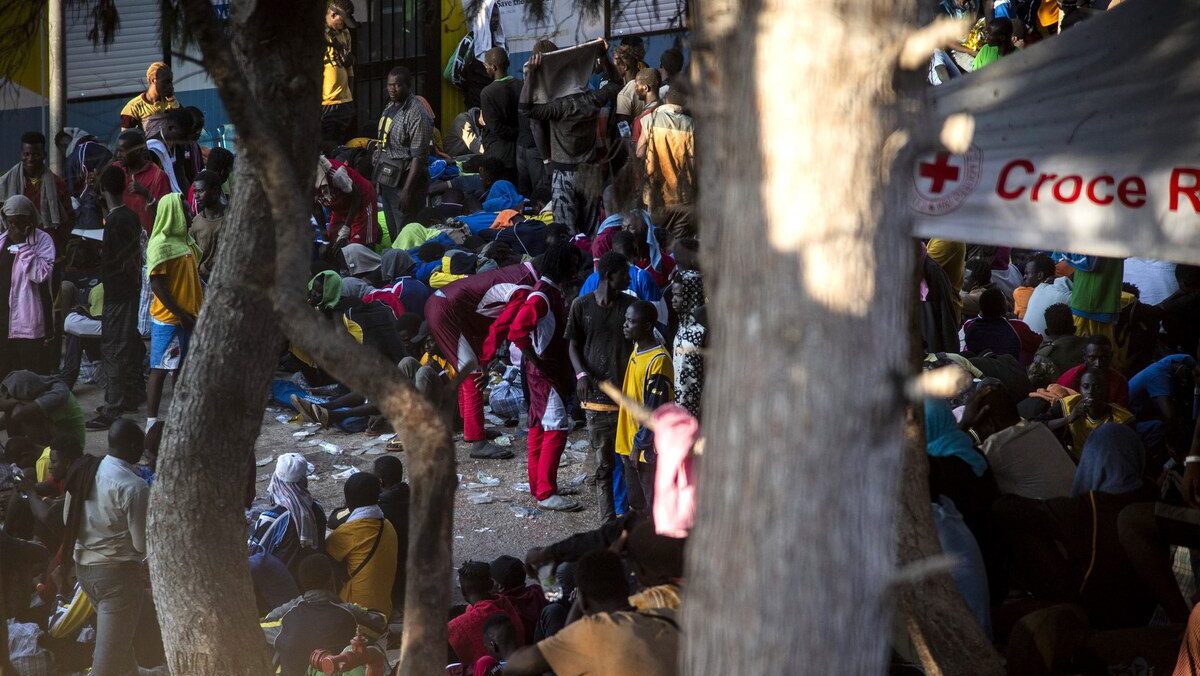
Recently arrived migrants in the overcrowded Lampedusa refugee center, Italy.
Photo: ALESSANDRO SERRANO / AFP
Germany announced a stop to taking in migrants from Italy on Wednesday, September 13th, The Telegraph reported. Berlin cites challenges to accommodate newcomers, while the Mediterranean country struggles with an unprecedented wave of arrivals, and its entire asylum system is on the brink of collapse.
Berlin also said that the move was necessary because Italy fails to comply with the Dublin regulation, which states that migrants should be returned to the first EU member state they entered until their asylum claims have been assessed.
“Given the currently high migratory pressure on Germany, the ongoing suspension of Dublin transfers by some member states, including Italy, reinforces the major challenges Germany is currently facing in terms of its reception and accommodation capacity,” the German interior ministry said on Wednesday.
Berlin’s suspension of the voluntary solidarity mechanism—of which Germany was one of the biggest champions back in 2015—will stay in place “until further notice,” but the interior ministry said it can be reversed if Rome begins to accept returned migrants under the Dublin rules again.
Italy, however, has bigger problems at the moment than going through all the appropriate procedures. As we reported earlier today, the country is facing what officials call an “invasion” after a record-breaking 5,000 migrants in 110 boats arrived on the island of Lampedusa in a single day.
The situation in Lampedusa is completely out of control, an unprecedented situation. Today in 30 minutes 35 boats of African hordes invaded us, so far 100 boats in one day. Giorgia Meloni has deported 190,000 invaders to date, a real apocalypse! https://t.co/drJGG347r2 pic.twitter.com/YhF319EHey
— RadioGenoa (@RadioGenoa) September 12, 2023
Adding this to the UN statistics as of September 10th, this year’s tally already surpassed 120,000 illegal arrivals, making 2023 the second worst year in Italy after 2016’s record of around 180,000.
What’s happening in Lampedusa was described on Wednesday night by Deputy PM Matteo Salvini as “an act of war,” which looks almost as if designed to destabilize Italy:
I’m convinced that there is a plan, some degree of control, behind this.
If more than 100 boats arrive in a few hours, this is not something spontaneous, it is organized, an act of war.
The island’s reception center is filled far beyond its capacity and has been for weeks, as authorities fear the whole infrastructure might collapse any moment.
Hell in Lampedusa, a situation completely out of control, a real unprecedented apocalypse https://t.co/drJGG33zBu pic.twitter.com/QcjQCs4OqY
— RadioGenoa (@RadioGenoa) September 14, 2023
Under the voluntary solidarity scheme in place for years, Germany was initially supposed to take in 3,500 asylum seekers. So far, Berlin accepted 1,700, including a thousand from Italy last year. “Therefore, Germany has already fulfilled its humanitarian responsibility,” The German interior ministry said, arguing that it had no choice but to suspend the relocations after 15,000 illegal migrants entered the country in August—the number Lampedusa can face in a single weekend.
Of course, not only Germany is lagging behind with its solidarity numbers. France and most of the thirteen member states who pledged to take part in the process also de facto suspended the practice or took in only a fraction of their already small share.
Not even half of the relocation target was reached last year, which was set for the entire EU at a mere 8,000 people, or less than 1% of the 874,000 people who applied for asylum in the bloc in 2022.
Therefore, the question inevitably arises: if not even the EU’s biggest countries are able to fulfill the smallest of their pledges when it comes to migrant relocations, why do they push for making the mechanism mandatory for every country under the new Migration Pact, which is currently being blocked in the Council by Poland and Hungary?
